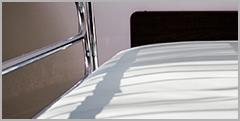
The production of medical equipment involves a variety of processes, which includes finding the right healthcare fabrics supplier. So how can you narrow down your options? Here are three important factors to consider:
- Ability of the supplier to provide customized fabrics solutions.
This means the supplier can meet your specific needs and provide a wide range of hospital fabrics. From anitimicrobial textiles to waterproof coverings for medical mattresses, your supplier should be able to provide a variety of options for your needs. Besides, going to several different suppliers for what you need to make your products can be a hassle.
- The quality of the supplier’s customer service.
This may seem trivial, but is actually essential. If you can’t communicate with your medical fabrics supplier, how can you produce quality products? Also, if there’s a mix-up or problem, you want your healthcare fabrics supplier to be responsive, open, and helpful. Remember, customer service can make-or-break your business.
- The supplier’s quality assurance program.
This is probably one of the most important things to consider. After all, the quality of the textile you use will determine the quality of your product. For example, if you’re manufacturing a medical curtain, you want to be sure the quality of the fabric is assured by the supplier. What exactly does that mean? It means your supplier has gone through the steps and processes to ensure that your fabric meets the standards for medical fabric products.
It’s important to remember that medical grade fabrics must be designed and developed with specific standards in mind. Those standards should always correspond with hospital regulatory requirements.
Hospital bedding and blankets have to be antimicrobial, while hospital curtains need to be flame resistant. Even the gowns and personal protective equipment used by doctors, nurses, staff, and patients include specialty medical fabrics designed to withstand the rigors of the healthcare environment. That’s why doing your due diligence and finding the right healthcare fabric supplier is essential for all medical product manufacturers.
Remember, healthcare-associated infections (HAIs) are a common problem for hospitals and they are looking for top quality medical fabric products to help reduce the risk of infections. In fact, according to the Center for Disease Control & Prevention (CDC), hospital related infections are indeed a “major and preventable” threat to a patient’s safety.
According to a CDC report, HAIs affect 5 percent of patients hospitalized in the U.S. This means there is strong demand for healthcare fabrics that are able to prevent infections. Antimicrobial features and stain, fluid, and odor resistant medical fabrics provide excellent safeguards in helping prevent infections. When you’re looking for the right medical fabrics supplier, do your due diligence and make sure the textiles you’re buying are fit for the job.
Now that you know a little more about healthcare fabrics, learn why Herculite has been the top choice of so many healthcare customers for over 50 years by downloading our eBook "Why Herculite is Uniquely Qualified to Deliver Quality Medical Fabrics”.
